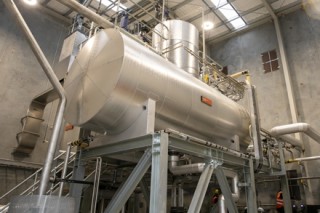Alpine Energy enables electrification and decarbonisation at WoolWorks
21 June 2023
Alpine Energy is proud to partner with WoolWorks, the world's largest wool scourer, in its remarkable decarbonisation journey. This case study highlights the successful collaboration between Alpine Energy and WoolWorks, showcasing the electrification of WoolWorks' Canterbury wool-scouring site and the significant benefits achieved through this sustainable initiative.
Objectives
The primary objective of the partnership between Alpine Energy and WoolWorks was to enable the decarbonisation of WoolWorks' Timaru facility.
The key goals included:
- replace a coal-fired boiler with an 8-Megawatt Electric Boiler
- reduce CO2 emissions by 11,000 tonnes annually, equivalent to removing 3000 cars from the roads
- achieve a 46% reduction in CO2 emissions by 2030 compared to the 2019 baseline year
- align with the Science Based Targets Initiative (SBTi) and commit to transparent reporting on climate action progress
- create new commercial opportunities and strengthen market position by embracing sustainable practices
Alpine Energy service delivery manager Damien Whiffen and WoolWorks general manager Shane Thurlow on location in Timaru
Methodology
The methodology involved a collaborative effort between Alpine Energy and WoolWorks.
The key steps included:
- conducting extensive research to identify the most suitable alternative to coal
- selecting an 8MVA electrode boiler and an industrial heat pump as the preferred solution
- collaborating with industry experts and technology providers to tailor the implementation process
- upgrading and enhancing Alpine Energy's network to fully support the electrification requirements
- implementing best practices and cutting-edge technology to seamlessly integrate the e-boiler system
Benefits
The electrification and decarbonisation of WoolWorks' Timaru facility have resulted in several significant benefits:
- reduction of 11,000 tonnes of CO2 emissions annually, contributing to a greener future
- enhanced sustainability and environmental responsibility within WoolWorks' operations
- improved market positioning, attracting customers committed to climate action
- access to new commercial opportunities and partnerships with sustainability-focused companies
- strengthened resilience and increased capacity within Alpine Energy's network
Importance
The electrification of WoolWorks' facility holds immense importance for both WoolWorks and the wider wool industry.
Key reasons include:
- meeting market demands – customers, especially in Europe, are increasingly seeking products from companies committed to climate action
- leading the industry – WoolWorks becomes one of the world's first early-stage textile processors to achieve decarbonisation
- driving sustainability – WoolWorks' initiative inspires other stakeholders in the supply chain to adopt carbon reduction initiatives
- fostering a sustainable value chain – WoolWorks' investment positions New Zealand suppliers favourably in the market and offers competitive advantages
- reducing reliance on offsetting – by prioritising carbon footprint reduction, WoolWorks demonstrates a commitment to reducing its environmental impact directly
Evaluation
The success of the electrification and decarbonisation initiative can be evaluated based on the following factors:
- achieving the target reduction of 11,000 tonnes of CO2 emissions annually
- adherence to the Science Based Targets Initiative and transparent reporting on progress
- market response and customer feedback, indicating the positive impact on the wool industry
- increased commercial opportunities and partnerships resulting from the sustainable value chain
- ongoing monitoring of energy efficiency and resource consumption to drive continuous improvement
The new e-boiler
Conclusion
The partnership between Alpine Energy and WoolWorks has resulted in a ground-breaking decarbonisation initiative, enabling the electrification of WoolWorks' Canterbury wool-scouring site. The successful implementation of an 8-Megawatt Electric Boiler and the reduction of 11,000 tonnes of CO2 emissions annually showcases the commitment of both companies to sustainability and climate action.
This achievement not only positions WoolWorks as a leader in the early-stage manufacturing of wool but also strengthens New Zealand's wool industry by attracting customers seeking eco-friendly products. Alpine Energy remains dedicated to empowering the community through sustainable partnerships, and this collaboration with WoolWorks exemplifies the shared vision of a brighter, cleaner future for all.


